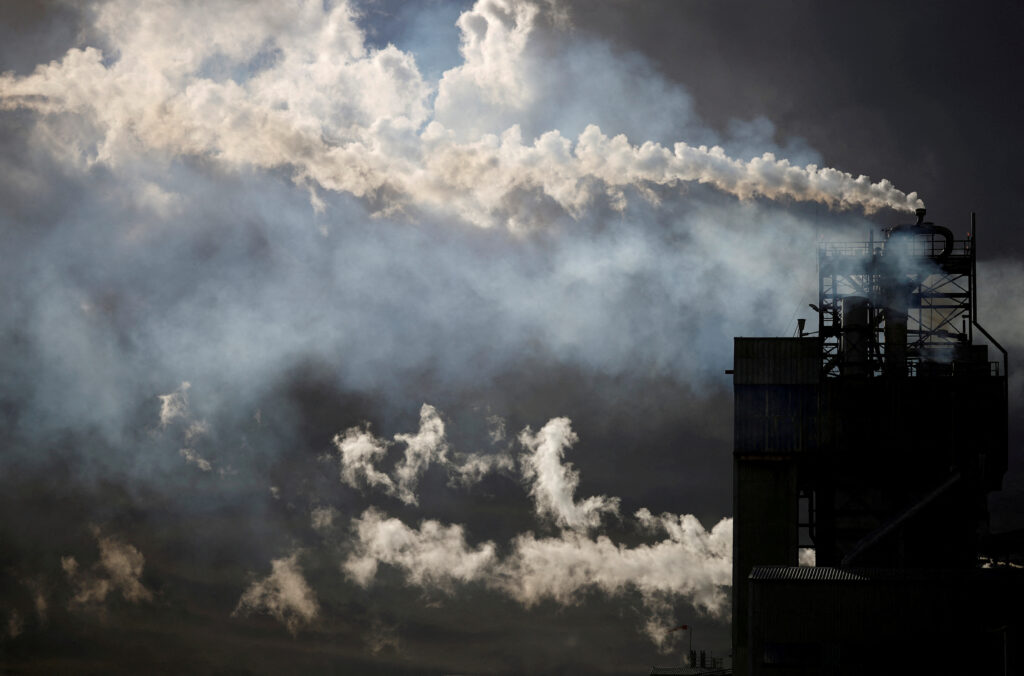
FILE PHOTO: A view shows emissions from the chimneys of Yara France plant in Montoir-de-Bretagne near Saint-Nazaire, France, March 4, 2022. REUTERS/Stephane Mahe/File Photo
DUBAI—Countries at the COP28 climate conference are considering calling for a formal phase-out of fossil fuels as part of the U.N. summit’s final deal to tackle global warming, a draft negotiating text seen on Tuesday, December 5, 2023, shows.
The proposal is set to spark heated debate among the nearly 200 countries at the two-week conference in Dubai, with some Western and climate-vulnerable states pushing for the language to be used and many oil and gas producers keen to leave it out.
Research published on Tuesday showed global carbon dioxide emissions from burning fossil fuels are set to hit a record high this year, fuelling concerns among scientists that efforts to combat climate change are not enough to avert its worst impacts.
The draft of what could be the final agreement from COP28, released by the U.N. climate body on Tuesday, proposed “an orderly and just phase-out of fossil fuels” which if adopted would mark the first global deal to end the oil age.
On the COP28 main stage, the CEOs of several major energy firms argued in favour of oil and gas, highlighting their progress in areas such as cutting the greenhouse gas methane.
“We are big guys and we can do big things. We can deliver results and we will have to report them very soon,” said Jean Paul Prates, CEO of Brazil’s state-run oil company Petrobras. “The energy transition will only be valid if it’s a fair transition,” he added.
READ MORE: Five things to watch for at COP28 climate talks
At least 2,400 fossil fuel lobbyists registered for this year’s summit, an analysis of U.N. registration data published by Kick Big Polluters Out showed, outnumbering the delegates from the 10 most climate vulnerable countries combined.
Climate activists staged several small protests against the presence of the fossil fuel industry.
The Marshall Islands, meanwhile, unveiled a national plan to adapt to rising sea levels, a recognition that the impacts of warming are already hitting its shores.
“While we hope for a world where the world fulfils the promise of the Paris Agreement to contain climate change, as an extremely climate vulnerable country we need to be realistic and honest about the difficult path ahead,” said Kathy Jetnil-Kijiner, the country’s climate envoy.
NEGOTIATING TEXT
The draft text for a COP28 final deal includes three options for dealing with fossil fuels.
The first is “an orderly and just phase-out”. In U.N. parlance, the word “just” suggests wealthy nations with a long history of burning fossil fuels would phase out fastest.
The second calls for “accelerating efforts towards phasing out unabated fossil fuels”. And a third would be to avoid mentioning a phase-out at all.
The United States, the 27 countries of the European Union and climate-vulnerable small island states are pushing for a fossil fuel phase-out to drive the deep CO2 emissions reductions scientists say are needed this decade.
Even so, none of the world’s major oil and gas-producing countries have plans to eventually stop drilling for those fuels, according to the Net Zero Tracker, an independent data consortium including Oxford University.
“We’re not talking about turning the tap off overnight,” German Climate Envoy Jennifer Morgan said. “What you’re seeing here is a real battle about what energy system of the future we are going to build together.”
Big producers including Saudi Arabia and Russia have resisted past proposals for a phase-out.
David Waskow, director of World Resources Institute’s international climate initiative, said he does not think a COP28 outcome was possible without a clear mandate for moving away from global reliance on oil, gas and coal.
“I don’t think we’re going to leave Dubai without some clear language and some clear direction on shifting away from fossil fuels,” he added.
The draft text also includes language calling for the scaling up of carbon capture technology, which is likely to draw pushback from some countries worried such nascent technologies are being used to justify the continued use of fossil fuels.
FOSSIL FUEL EMISSIONS RISING
On the sidelines of COP28, U.S. special climate envoy John Kerry launched an international plan involving 35 countries to boost nuclear fusion, a nascent technology that would seek to harness the intense process that powers the sun.
“There is potential in fusion to revolutionize our world,” Kerry said.
Fusion is among a number of ambitious and sometimes unlikely ideas aimed at helping speed decarbonization.
Countries are expected to emit a total 36.8 billion metric tons of CO2 from fossil fuels in 2023, a 1.1% increase from last year’s record, according to the Global Carbon Budget report by scientists from more than 90 institutions.
The emissions performance pulls the world further away from preventing global warming exceeding 1.5 degrees Celsius above pre-industrial times, it said.
For daily comprehensive coverage on COP28 in your inbox, sign up for the Reuters Sustainable Switch newsletter here.
Disclaimer: The comments uploaded on this site do not necessarily represent or reflect the views of management and owner of Cebudailynews. We reserve the right to exclude comments that we deem to be inconsistent with our editorial standards.
